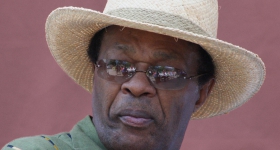As clichés go, "Filipina nurse" is one of the meatier ones. A recent, and fascinating, panel discussion at Kearny Street Workshop organized around Jenifer Wofford's Market Street kiosk comic about a Filipina nurse in the '70s gave me a lot of background on the phenomenon. As I wrote in a review:
It was the US that created a system of modern hospitals and
state-of-the-art nursing schools in the Philippines in the early part
of the century. American certification made Filipina nurses (primarily
women due to the imposition of American gender roles) sought after the
world over. Succeeding economic problems throughout decolonization sent
nurses abroad; the declaration of martial law by Marcos in 1973 kicked
off another diaspora; and the collapse of the Philippine middle class
following Aquino's economic reforms in the '80s completed the brain
drain. On the other side, the nurse diaspora exemplifies one vitally
important recent immigration trend in the United States: following the
failure of US secondary-level science and math education: importing
medical, engineering, and other science-based professionals from Asia.
It's been clear to anyone observing Asian/American immigration over the past thirty-odd years that the US needs Asian professionals and service. And yet, as the ongoing Filipino veterans movement shows, the US has no inclination to own up to its responsibility vis-å-vis Filipinos who serve us in any manner. So why would our government fail to cut off its nose to spite its face when it comes to service that we still need? A handful of off-the-radar stories from last week have made it clear that this living stereotype thicket is only going to get thornier the older our Fattest Generation gets.
This article from the Filipino Global Nation website tells us that the US will need 1.2
million new nurses by 2014 to take care of the aging population, but is
unprepared to process the visa applications from Filipino nurses that
could come in. The article advises Pin@ys to look elsewhere ... to the
Middle East, for example, where the pay is lower, but the wait is much
shorter. Apparently, 20,000 jobs await Filipino healthcare workers in Saudi Arabia and elsewhere, whence recruiters have been traveling to the Philippines to fill up their hungry quotas.
This article from Arabianbusiness.com lays out the whole sorry tale from the Middle East, where nursing is so low-status that fathers won't allow their daughters to study it, causing Qatar to close its only nursing school. Regional nurses will be paid reasonably, but imported nurses, especially from the Philippines, will be paid three-quarters or even half what Arab nurses are paid. And conditions in many of these countries can be dangerous for professionals. And yet, countries like Saudi Arabia are facing a shortage of up to 100,000 nurses. Competition for nurses is so stiff in the Arab world that even Arab countries are exporting their nurses to other Arab countries.
The Arab world is not the only place where culture and racism conflict with bare, practical need. A similar problem seems to be plaguing New Zealand, where Filipina nurses are protesting new rules that
require a higher level of English acquisition, and longer degree programs. And
yet, New Zealand also faces a nurse shortage. And a nursing
exam-cheating scandal involving a recruiter and his Filipino nurses is
rocking the medical community of Oslo, Norway. From a distance, it's impossible to tell if this last one is an isolated incident, or a result of systematic racism against a professional foreign population.
But to return to the US: we are still considered the destination for foreign nurses; American nurses are considered to have the highest status and remuneration, and there's still a cultural desire to emigrate to the US. But I have to wonder how long this will be the case, given the worldwide nurse shortage, and the fact that, in recent history, other countries have had a better track record at recognizing and adapting to new circumstances in their immigration policies. Is the US going to find itself -- within the next decade -- out in the cold in the global competition for healthcare workers, unable to compete with countries more willing to streamline bureacracy and deal effectively with racism and xenophobia?
Lord knows we're not getting off to wonderful start. In this colorfully headlined
local San Francisco report, AsianWeek tells us that SF is "hemorraging"
Filipina nurses. Turns out, the city had to hand out over 400 pink
slips in the wake of the meltdown, including 285 in the health
department, 165 of which were to registered nurses. There are no
numbers in the article about Fil-Ams losing their jobs, the writer just
speculates that, since 41.5 percent of the city's nurses are Pin@y, they "probably" bore the brunt of the firings.
In a classic San Francisco moment, the board of supervisors that will
have to carry out these APA-affecting layoffs has three APA members,
only the second time this has happened.
ETA: A commenter (below) remarked on the nursing exam cheating scandals in the Philippines earlier this year. You can read about them here, here, and here.









Comments